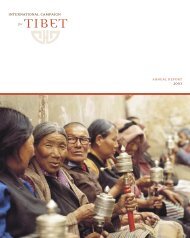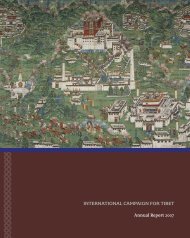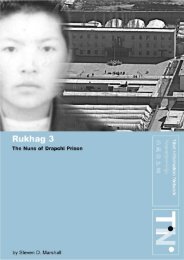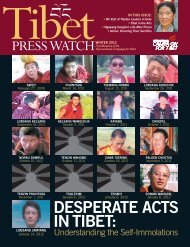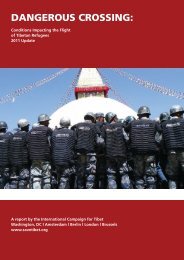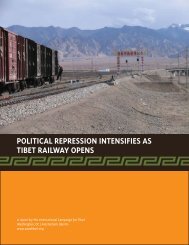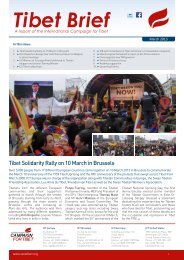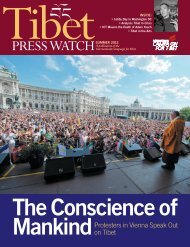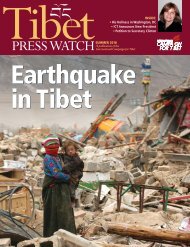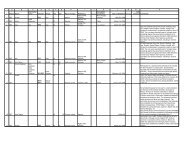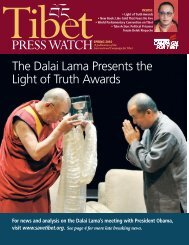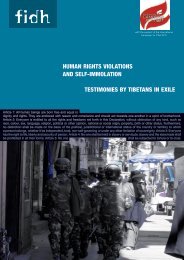download the report - International Campaign for Tibet
download the report - International Campaign for Tibet
download the report - International Campaign for Tibet
You also want an ePaper? Increase the reach of your titles
YUMPU automatically turns print PDFs into web optimized ePapers that Google loves.
INTERNATIONAL CAMPAIGN FOR TIBET<br />
freedoms and <strong>the</strong> broader freedoms to dispose of <strong>the</strong>ir own<br />
income in legal ways <strong>the</strong>y choose.<br />
Zhou Yongkang acquired a significant degree of political<br />
power in a remarkably short period of time: less than 10<br />
years ago, aside from being on <strong>the</strong> periphery of <strong>the</strong> CCP Central<br />
Committee, his entire career had been spent in politically<br />
appointed positions within China’s state-owned oil<br />
industry. His meteoric rise has since taken him through two<br />
ministerial-level positions, and Party Secretary of Sichuan<br />
province. His most recent promotion in October 2007 made<br />
him elevated to become one of only nine members of <strong>the</strong><br />
Politburo’s Standing Committee, <strong>the</strong> highest and most powerful<br />
body in <strong>the</strong> CCP’s hierarchy.<br />
Former Minister <strong>for</strong><br />
Public Security, Zhou<br />
Yongkang<br />
When he was promoted to <strong>the</strong> Politburo’s Central Committee, Zhou was also promoted<br />
from being Deputy Secretary to full Secretary of <strong>the</strong> Political and Legislative Affairs<br />
Committee within <strong>the</strong> CCP’s Central Committee, granting him political authority<br />
over China’s entire police, judicial and state security structures.<br />
A prominent feature of Zhou Yongkang’s three-year tenure as Party Secretary of<br />
Sichuan province was a severe crackdown on <strong>the</strong> practice and teaching of <strong>Tibet</strong>an<br />
Buddhism in <strong>the</strong> province. Two large and thriving monastic teaching institutions —<br />
Larung Gar and Yachen Gar — which were spearheading <strong>the</strong> revival of <strong>Tibet</strong>an Buddhism<br />
in <strong>the</strong> area, were both drastically reduced in size when many hundreds of<br />
monks and nuns, including many Chinese devotees, were expelled and <strong>the</strong>ir dwellings<br />
demolished, ostensibly because <strong>the</strong> institutes did not have official permission to<br />
expand as much as <strong>the</strong>y had. It is thought that <strong>the</strong> campaigns against <strong>the</strong> institutions<br />
were led by Yin Fatang, who served as Party Secretary of <strong>the</strong> TAR from 1980 to 1985,<br />
but Yin without doubt had <strong>the</strong> backing and encouragement of Zhou Yongkang.<br />
It was also during Zhou Yongkang’s tenure as Party Secretary of Sichuan province<br />
that <strong>the</strong> influential and highly popular religious leader in Kham, Tenzin Delek Rinpoche,<br />
was detained on what are regarded widely as trumped up bombing charges.<br />
Tenzin Delek Rinpoche had studied in India in <strong>the</strong> 1980s where he was recognized by<br />
<strong>the</strong> Dalai Lama as <strong>the</strong> reincarnation of a senior lama. Upon his return to <strong>Tibet</strong> he frequently<br />
crossed paths with <strong>the</strong> local authorities in his ef<strong>for</strong>ts to prevent or limit de<strong>for</strong>estation<br />
in his local area, to open schools and old people’s homes, and to re-establish<br />
monasteries which had been shut down or destroyed during <strong>the</strong> Cultural Revolution.<br />
115



